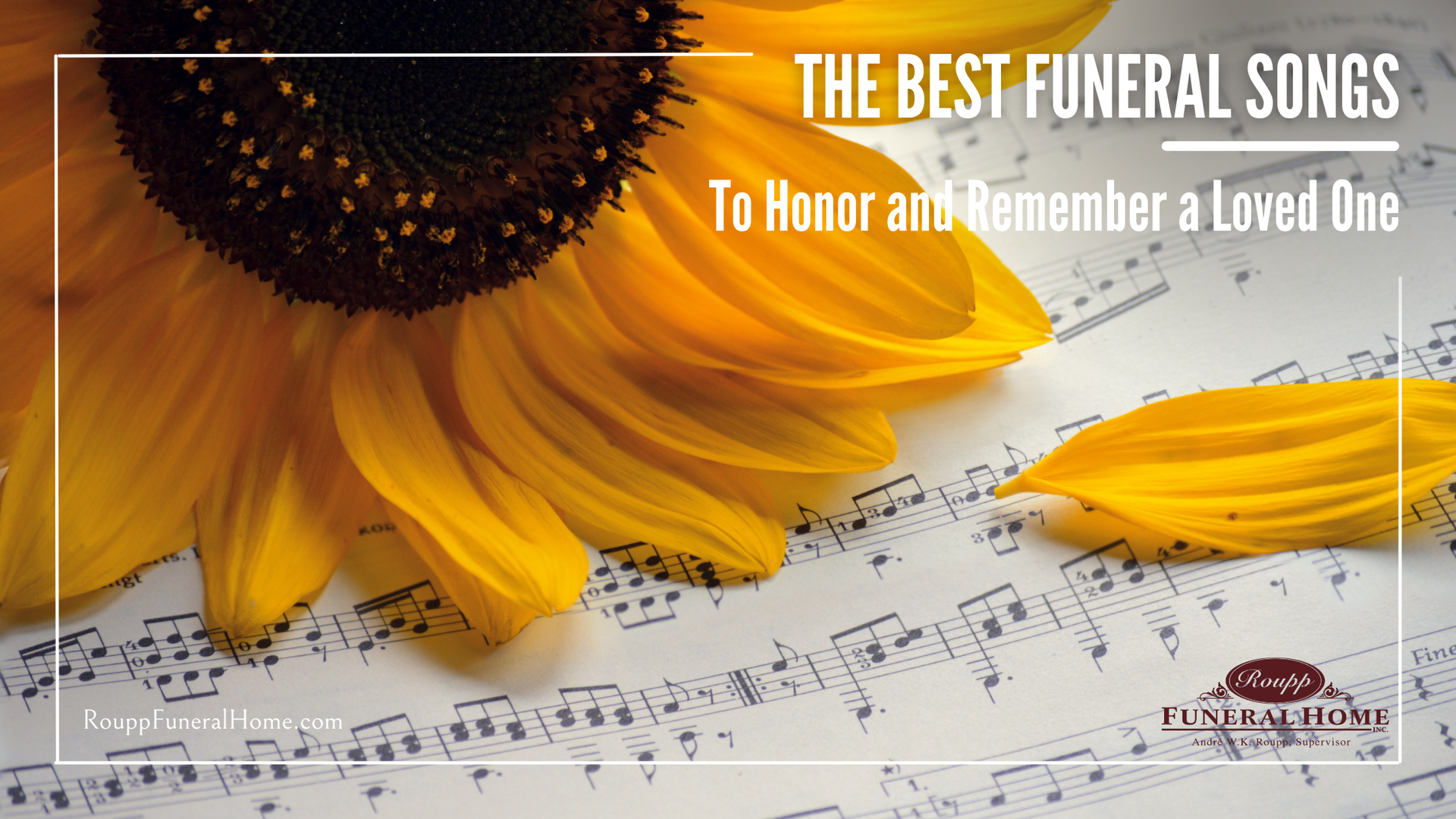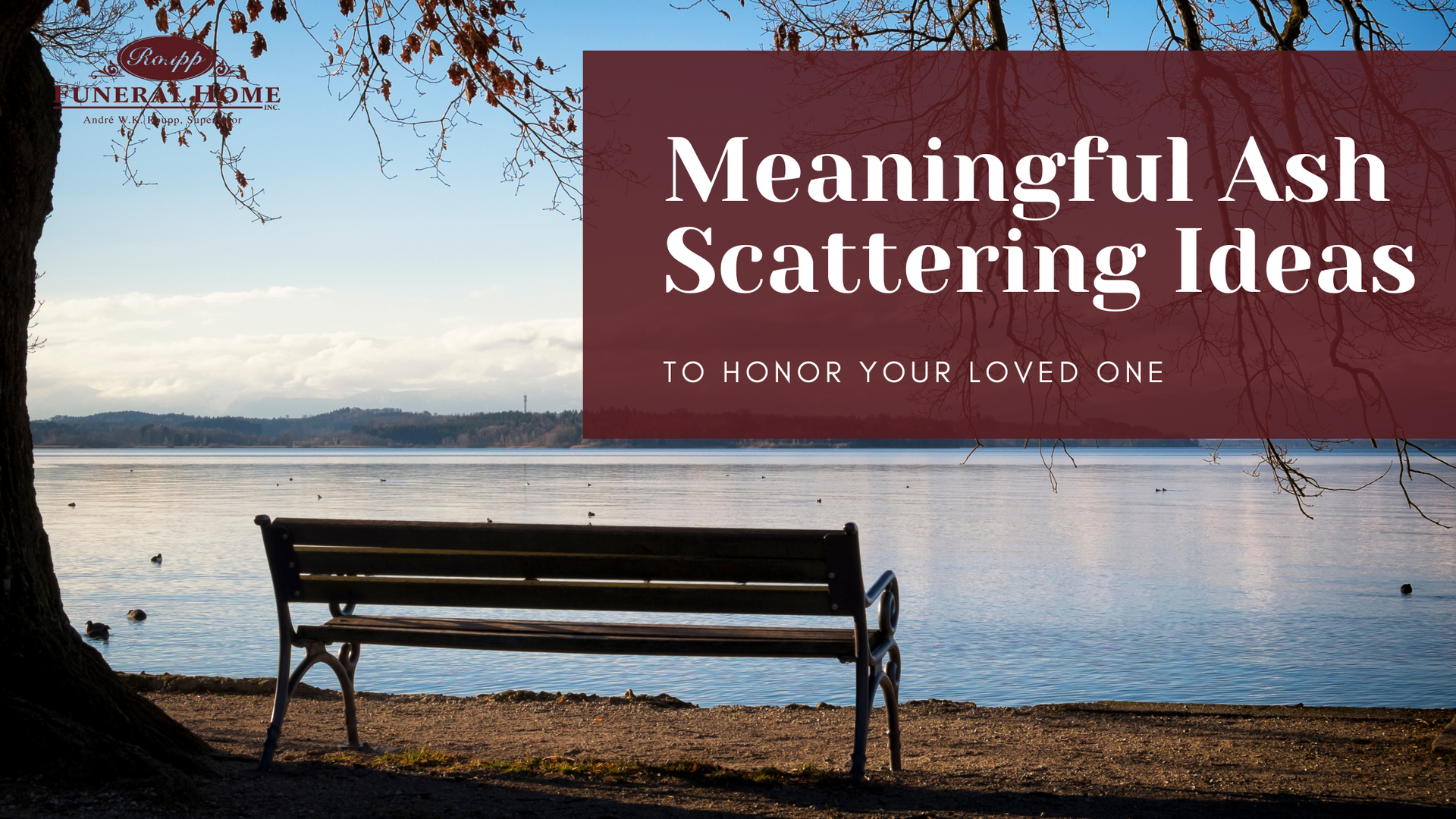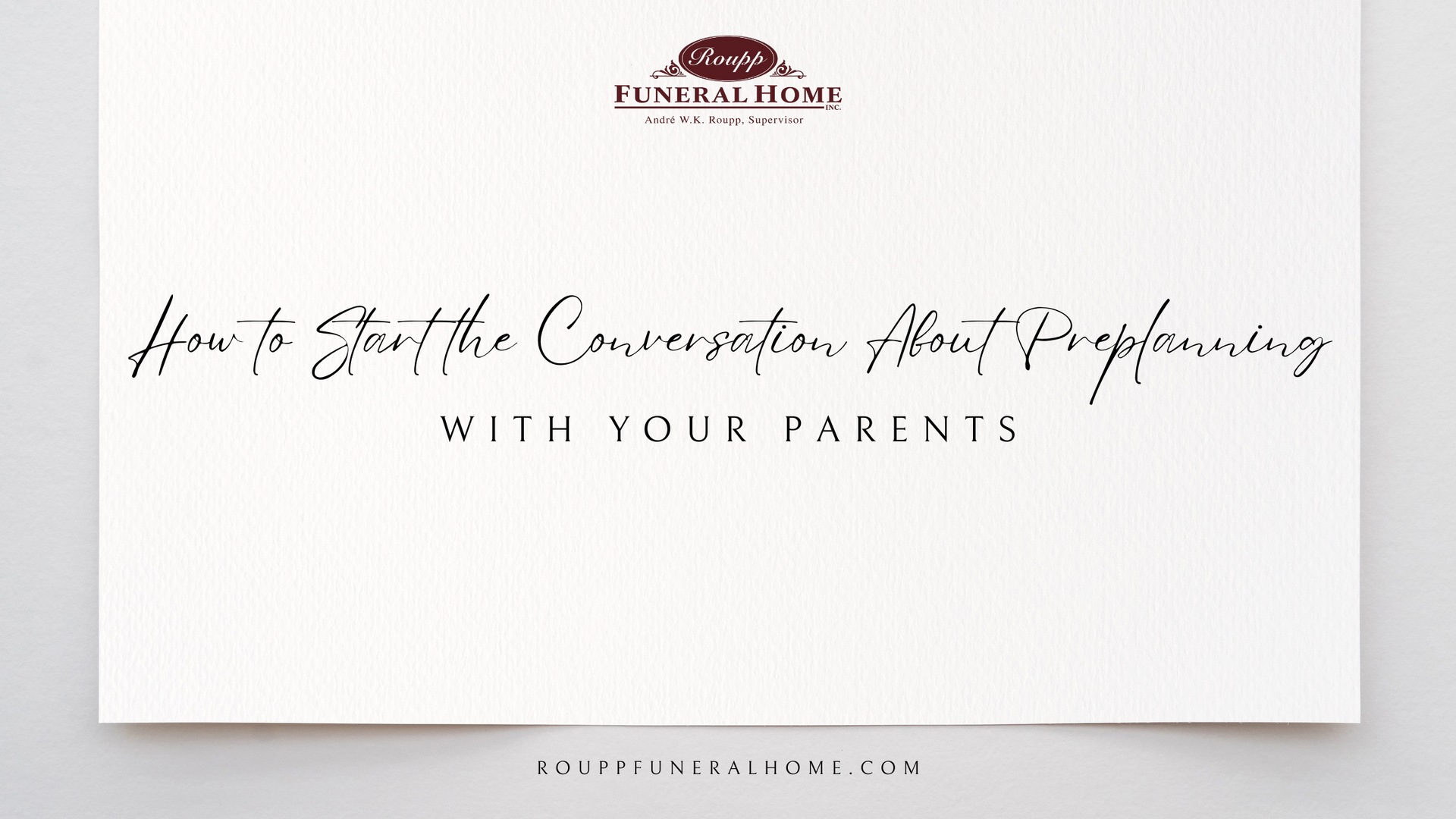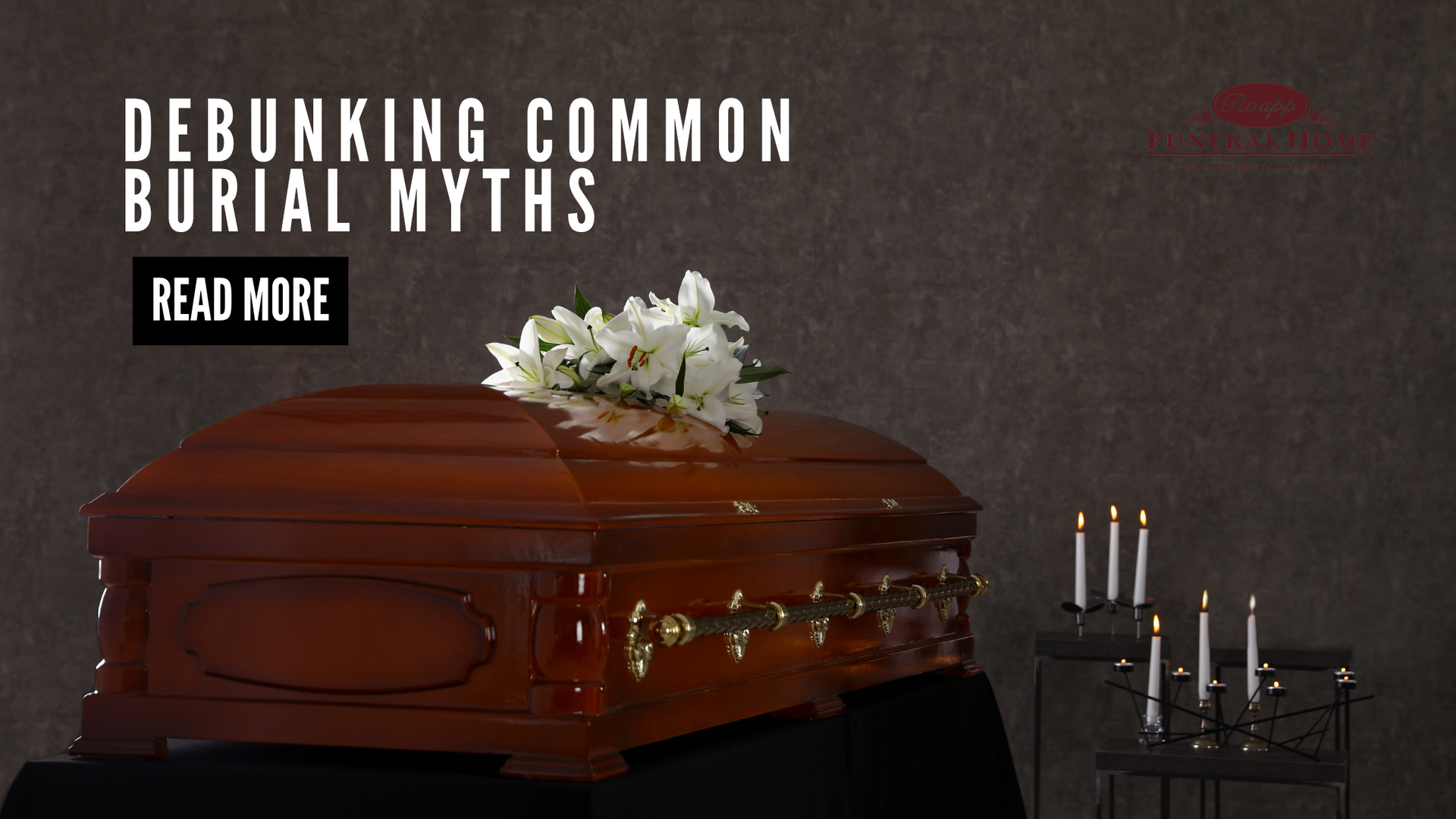Roupp Funeral Home Blog
Keep up with the latest news, events, and information from Roupp Funeral Home here at our blog.

By Andre Roupp
•
March 17, 2025
Music possesses a profound ability to express emotions, evoke memories, and provide comfort during times of loss. Selecting the appropriate songs for a funeral service is a meaningful way to honor and celebrate the life of a loved one. In this article, we've curated a selection of songs across various genres, each accompanied by a YouTube link for your listening convenience. The Importance of Funeral Songs Funeral songs play a pivotal role in memorial services, serving multiple purposes: Emotional Expression : Music can articulate feelings that words alone may struggle to convey, offering solace and understanding to those grieving. Personal Reflection : Choosing specific songs can reflect the personality, beliefs, or passions of the departed, making the service more personalized and meaningful. Community Connection : Shared musical experiences can unite attendees, fostering a sense of collective mourning and support. How to Choose the Right Funeral Song Selecting the appropriate music involves thoughtful consideration: Reflect on the Deceased's Preferences : Consider songs or genres they loved, which can serve as a heartfelt tribute. Consider the Service's Tone : Decide whether the ceremony will be somber, celebratory, or a mix of both, and choose music that aligns with this mood. Pay Attention to Lyrics : Ensure the words resonate with the intended message and are appropriate for the setting. Cultural and Religious Sensitivity : Some traditions have specific musical requirements or prohibitions; it's essential to respect these guidelines. Audience Consideration : Think about the attendees and select songs that will be meaningful and comforting to them. Our Funeral Song Suggestions: Classical & Instrumental "Ave Maria" – Franz Schubert This timeless piece offers serenity and grace, often chosen for its soothing melody and spiritual significance. Listen on YouTube "Canon in D" – Joh a nn Pachelbel A baroque classic, "Canon in D" is celebrated for its harmonious and repetitive progression, providing a calming backdrop during reflective moments. Listen on YouTube "Clair de Lune" – Claude Debussy Translating to "Light of the Moon," this piece captures an ethereal and introspective mood, making it a heartfelt choice for farewells. Listen on YouTube Traditional & Religious "Amazing Grace" – Traditional A hymn of redemption and hope, "Amazing Grace" has been a staple in funeral services, resonating with many for its uplifting message. Listen on YouTube "How Great Thou Art" – Traditional This hymn praises the wonders of creation and the divine, offering comfort through its powerful lyrics and melody. Listen on YouTube "The Lord’s Prayer" – Andrea Bocelli & Celine Dion A musical rendition of the Christian prayer, this duet brings a profound sense of peace and honor. Listen on YouTube Modern & Pop "Tears in Heaven" – Eric Clapton Written after the tragic loss of his son, Clapton's heartfelt lyrics and melody convey deep sorrow and longing. Listen on YouTube "Supermarket Flowers" – Ed Sheeran A touching tribute to Sheeran's late grandmother, this song reflects on loss and cherished memories. Listen on YouTube "See You Again" – Wiz Khalifa ft. Charlie Puth Originally featured in the "Furious 7" soundtrack as a tribute to actor Paul Walker, this song speaks to reunion and remembrance. Listen on YouTube Rock & Alternative "Wish You Were Here" – Pink Floyd This classic rock song reflects on absence and longing, making it a bittersweet choice for honoring a loved one. Listen on YouTube "Hallelujah" – Jeff Buckley Buckley's rendition of Leonard Cohen's song offers a hauntingly beautiful melody that resonates with themes of love and loss. Listen on YouTube "In My Life" – The Beatles A reflective song that looks back on fond memories, acknowledging the impact of those we've loved. Listen on YouTube Country "Go Rest High on That Mountain" – Vince Gill Inspired by personal loss, this song offers a message of peace and eternal rest. Listen on YouTube "If Heaven Wasn't So Far Away" – Justin Moore This song imagines a world where visiting lost loved ones is just a drive away, providing comfort through its heartfelt lyrics. Listen on YouTube "When I Get Where I'm Going" – Brad Paisley ft. Dolly Parton A duet that envisions the peace and joy of the afterlife, offering solace to those grieving. Listen on YouTube Selecting music that resonates with the personality and preferences of your loved one can create a deeply personal and meaningful tribute. At Roupp Funeral Home, we understand the importance of these choices and are here to support you in creating a service that honors and celebrates their unique life. Choosing music can be a small but powerful part of pre-planning your funeral. Pre-planning allows you to make decisions on your own terms, ensuring that your final wishes are honored while easing the emotional and financial burden on your loved ones. From selecting burial or cremation options to choosing meaningful details like music and readings, pre-planning provides peace of mind and helps create a service that truly reflects your life. If you’d like to explore what it means to pre-plan and take the first step, reach out to us here at Roupp Funeral Home.

By Andre Roupp
•
March 3, 2025
Losing a loved one is never easy, and finding the right way to honor their memory can be an emotional journey. Many families choose cremation for their loved ones, and scattering ashes can be a beautiful tribute that reflects their life and passions. If you're considering ash scattering, here are some meaningful ideas to create a heartfelt and lasting tribute. 1. Scattering at a Favorite Location Did your loved one have a favorite park, beach, or hiking trail? Choosing a place they cherished can make for a deeply personal and meaningful ceremony. Always check local regulations before scattering ashes in public areas. 2. Water Scattering Ceremony For those who loved the water, scattering ashes in a river, lake, or ocean can be a peaceful and symbolic farewell. Biodegradable urns are available to ensure an eco-friendly process that gently releases the ashes into the water. 3. Planting a Memorial Tree Incorporating ashes into the soil of a newly planted tree can provide a living memorial that continues to grow in their honor. Special biodegradable urns allow ashes to blend with the soil, giving life to a beautiful tree that symbolizes renewal and remembrance. 4. Aerial Scattering Some families choose to release their loved one’s ashes from an aircraft, allowing them to be carried by the wind over a scenic landscape. This can be a moving way to let their spirit soar in a final farewell. 5. Scattering in a Memorial Garden Many cemeteries and memorial parks offer dedicated scattering gardens, where families can gather to say goodbye in a peaceful and reflective setting. These gardens provide a lasting place to visit and remember your loved one. If this is chosen, be sure to only scatter in designated, cemetery approved areas. 6. Creating a Fireworks Tribute For a unique and celebratory farewell, ashes can be incorporated into fireworks, creating a spectacular display that lights up the night sky in their honor. This option can be a wonderful way to celebrate a life well lived. 7. Casting Ashes in the Wind A simple yet powerful tribute, scattering ashes in the wind allows your loved one’s remains to become one with nature. This is often done on mountaintops or wide-open spaces with a meaningful connection. 8. Personalized Keepsakes If you prefer to keep a part of your loved one close, you can incorporate a portion of their ashes into jewelry, glass art, or other keepsakes while still scattering the rest in a meaningful location. Choosing the right ash scattering option is a deeply personal decision. Whatever you decide, be sure it reflects the spirit and wishes of your loved one while giving your family a sense of peace and closure. Please be sure to review local laws, rules, and regulations when scattering ashes, and obtain permission if needed. If you need guidance, Roupp Funeral Home is here to help you navigate this important decision with compassion and care.

By Andre Roupp
•
February 17, 2025
Discussing funeral preplanning with your parents may feel daunting, but it’s one of the most meaningful conversations you can have. While it’s natural to avoid the topic, planning ahead can relieve stress, reduce financial burdens, and ensure their wishes are honored. Here’s how to approach this important discussion with care and confidence. Choose the Right Time and Setting Timing is key when bringing up preplanning. Instead of discussing it during a stressful situation, look for a peaceful moment when your parents are relaxed. Perhaps over coffee, after a family gathering, or during a quiet afternoon at home. A calm, comfortable environment allows for open and thoughtful discussion. Express Your Intentions Clearly Start by sharing why you’re bringing up the topic. Emphasize that preplanning is about making things easier for the family in the future. You might say, “I want to make sure your wishes are honored, and preplanning can help prevent any difficult decisions for us later on.” Reassure them that this isn’t about being morbid—it’s about ensuring peace of mind. Listen and Respect Their Wishes Your parents may have already considered certain aspects of their funeral, or they may feel uncertain about making decisions. Give them space to express their thoughts and feelings. Ask open-ended questions like, “Have you ever thought about how you’d like your service to be?” or “Are there any traditions or personal touches that are important to you?” Highlight the Benefits of Preplanning Many people don’t realize that preplanning can relieve their family of emotional and financial stress. Explain that arranging details in advance locks in costs, avoids last-minute decision-making, and allows them to personalize their service the way they want. Reach out to us here at Roupp Funeral Home - we’re happy to share any resources or guidance to make the process easier. Offer Support and Take It One Step at a Time If they seem hesitant, remind them that preplanning doesn’t have to be done all at once. Offer to research options together or schedule a consultation with a funeral professional who can answer their questions. Taking small steps can make the process feel less overwhelming. Let Roupp Funeral Home Help At Roupp Funeral Home, we understand that talking about end-of-life planning isn’t easy. Our compassionate team is here to guide families through the process with sensitivity and care. If your family is ready to explore preplanning, we’re happy to provide information and support every step of the way. Starting the conversation may be challenging, but it can also bring reassurance and comfort. By taking this step now, you’re ensuring that your parents’ wishes are honored and giving your family the gift of peace of mind.

By Andre Roupp
•
February 3, 2025
Planning a funeral can be an emotional and overwhelming process, especially when misinformation about burial and funeral practices complicates decisions. At Roupp Funeral Home, we aim to provide clarity and support as you navigate these important choices. Let’s clear up some of the most common myths about burials. Myth #1: Embalming Is Required for Any Service Many people believe embalming is mandatory for all funeral services, but this is not the case. Embalming is only required in specific situations, such as when a public viewing is planned or when transporting a body across state lines. For private family services, direct burial, or cremation, embalming is often not necessary. We’re happy to explain the options and help you choose what works best for your preferences and circumstances. Myth #2: Cremation Prevents You from Holding a Traditional Funeral Service Cremation is often misunderstood as a process that eliminates traditional funeral options. In reality, families who choose cremation can still hold a full range of services, including viewings, memorials, and celebrations of life. Cremation simply provides flexibility, allowing you to honor your loved one’s wishes while also creating a meaningful experience for family and friends. Myth #3: Only Certain Religions Allow Cremation Although cremation was traditionally prohibited in some religions, many faiths now permit it as a choice for final disposition. For example, the Catholic Church allows cremation as long as the remains are treated with respect, not separated, and buried or entombed in a sacred place. We can help guide you through understanding your faith’s perspective on cremation and work to accommodate any specific needs. Myth #4: Funerals Are Only for Immediate Family Funerals are a time for anyone who cared about the deceased to come together, pay respects, and find support in shared grief. Whether attendees are close relatives, friends, neighbors, or colleagues, everyone is welcome to honor the life of your loved one. These gatherings provide an opportunity for connection and healing during a difficult time. At Roupp Funeral Home, we believe in educating families and providing personalized support every step of the way. If you have any questions about burial or cremation options, we’re here to help. Reach out to us today to discuss how we can assist you in planning a meaningful tribute to your loved one.

By Andre Roupp
•
January 20, 2025
For many, cemeteries evoke images of somber reflection, a place reserved for mourning and remembrance. However, cemeteries offer more than just a final resting place for loved ones. They can also be a source of profound mental, emotional, and even physical benefits. Whether you’re seeking peace, clarity, or a deeper connection with life, visiting cemeteries can be surprisingly therapeutic. Let’s explore why these tranquil spaces are good for your health. 1. Encourages Mindfulness and Reflection Walking through the serene paths of a cemetery invites mindfulness, allowing you to slow down and focus on the present moment. Cemeteries offer a rare opportunity to disconnect from daily stressors and reconnect with ourselves. The calm environment encourages quiet contemplation, helping visitors process emotions and gain perspective on life. The act of reflecting on the lives of those who have passed can be humbling and grounding. It reminds us of the preciousness of life and motivates us to live more intentionally. Such mindful practices have been linked to reduced stress, lower blood pressure, and improved mental clarity. 2. Provides a Peaceful Setting for Exercise Cemeteries are often designed with beautiful landscapes, featuring shaded walking paths, lush greenery, and historical architecture. These elements make them an ideal location for leisurely strolls or gentle exercise. Physical activity in such a peaceful environment can enhance your mood and energy levels, thanks to the release of endorphins. Walking among the gravestones also allows you to enjoy nature’s restorative effects. Studies have shown that spending time outdoors, particularly in green spaces, can reduce symptoms of anxiety and depression. The combination of physical movement and a serene setting makes cemetery visits beneficial for both body and mind. 3. Offers a Unique Connection to History Cemeteries serve as living museums, offering a tangible connection to the past. Reading the names, dates, and epitaphs on gravestones can spark curiosity about the lives and stories of those who came before us. Learning about local history or discovering forgotten tales can foster a sense of belonging. Engaging with history in this way can also provide comfort during times of personal struggle. Seeing the span of generations reminds us that challenges and triumphs are a shared human experience, offering reassurance that we’re not alone. 4. Promotes Emotional Healing For those grieving the loss of a loved one, visiting a cemetery can be a cathartic experience. Spending time at a gravesite allows individuals to express emotions, find solace, and feel closer to those they’ve lost. This ritualistic act of remembrance can help facilitate the healing process, providing a sense of closure and peace. Even if you’re not grieving, cemeteries can evoke feelings of gratitude and empathy. Reflecting on the fragility of life can inspire deeper connections with others and a greater appreciation for the present. 5. Cultivates Spiritual Growth Cemeteries are inherently spiritual places, inviting contemplation of life, death, and the mysteries of existence. For many, visiting a cemetery can strengthen their faith or spiritual beliefs, offering comfort in the continuity of life and the possibility of an afterlife. Engaging with these themes can help alleviate existential anxiety and foster a sense of peace with life’s inevitable cycles. Cemeteries encourage us to confront mortality in a way that’s gentle and reflective, leading to personal growth and greater inner peace. 6. Strengthens Community Connections Cemeteries are not just places of individual reflection; they are also spaces where communities come together to honor the past. Participating in memorial events, cemetery tours, or cleanup days can strengthen community bonds and foster a sense of shared purpose. Such activities remind us of the importance of collective remembrance and the value of preserving these sacred spaces for future generations. Making Cemeteries a Part of Your Routine Visiting a cemetery doesn’t have to be a rare occasion. Incorporating cemetery visits into your routine can provide a consistent source of calm and inspiration. Whether you’re seeking solitude, engaging with history, or finding a quiet place to walk, cemeteries can be a sanctuary for the soul. At Roupp Funeral Home, we understand the profound impact cemeteries can have on well-being. We encourage our community to embrace these spaces not only as places of remembrance but also as sources of healing and growth. Take a moment to experience the unique peace that cemeteries offer. You may find that these sacred spaces have more to offer than you ever imagined.

By Andre Roupp
•
January 6, 2025
In the midst of grief, the task of going through a loved one’s belongings can feel overwhelming. Whether you are sorting through their clothing, personal items, or sentimental keepsakes, this process can be both emotionally and physically exhausting. However, with thoughtful planning and a gentle approach, it can also be a meaningful step in your journey of healing. Here are some tips to help you navigate this sensitive task with care and compassion. 1. Give Yourself Time There is no set timeline for when to begin going through your loved one’s belongings. Some people may feel ready to start shortly after the funeral, while others may need weeks, months, or even years. Listen to your emotions and proceed when you feel ready. Remember, there’s no “right” way to grieve or to handle this process. 2. Create a Plan Before diving in, it’s helpful to create a plan. Decide which area you want to start with and set realistic goals for each session. For instance, you might tackle one closet or a single drawer at a time. Breaking the task into smaller, manageable parts can make it less daunting. 3. Ask for Help Sorting through a loved one’s belongings doesn’t have to be a solo endeavor. Invite trusted family members or friends to assist you. Their support can provide both practical help and emotional comfort. Additionally, having others present can make it easier to share stories and memories as you work. 4. Prepare for Emotional Moments It’s natural to encounter emotional triggers during this process. Items like handwritten notes, photographs, or clothing with a familiar scent can evoke strong memories. Allow yourself to feel these emotions, and take breaks if needed. 5. Sort Items into Categories To stay organized, sort items into categories as you go. Common categories include: Keep: Items with sentimental or practical value that you want to hold onto. Donate: Belongings that could benefit others, such as clothing or household items. Sell: Valuable items that you’re not keeping but could sell. Discard: Things that are no longer useful or meaningful. Using labeled boxes or bags for each category can streamline the process and prevent second-guessing. 6. Honor Their Memory Consider setting aside a few special items to honor your loved one’s memory. These could be displayed in your home, included in a scrapbook, or used to create a memorial piece, such as a quilt or shadow box. These keepsakes can provide comfort and a tangible connection to your loved one. 7. Be Mindful of Family Dynamics When multiple family members are involved, differing opinions about what to do with certain items can arise. Open communication and compromise are essential. If there’s disagreement about a specific item, consider taking a step back and revisiting the decision later. In some cases, dividing or sharing items might be an option. 8. Seek Professional Support If the process feels too overwhelming, consider enlisting the help of a professional organizer or estate specialist. These professionals are experienced in handling sensitive situations and can provide guidance and support tailored to your needs. 9. Celebrate Progress Acknowledge your accomplishments, no matter how small. Completing even a single step, like clearing out a drawer or organizing a box, is a significant achievement. Celebrating progress can help motivate you to continue. 10. Practice Self-Care Above all, prioritize self-care during this emotionally taxing time. Ensure you’re getting enough rest, eating well, and seeking support when needed. If feelings of grief become overwhelming, consider speaking with a counselor or joining a support group to process your emotions in a safe space. While going through a loved one’s belongings can be heart-wrenching, it also offers an opportunity to reflect on the memories and legacy they’ve left behind. By approaching the task with patience and compassion, you can create a sense of closure and honor their life in a meaningful way. At Roupp Funeral Home, we understand the complexities of grief and are here to support you every step of the way. Whether you need guidance, resources, or a compassionate ear, don’t hesitate to reach out. You are not alone on this journey.
OPT-IN TO RECEIVE SPECIAL ANNOUNCEMENTS BY TEXTING THE KEYWORD "ROUPP" TO
(877) 826-0261
©
Roupp Funeral Home. ALL RIGHTS RESERVED.
A Year of Grief Support
Sign up for one year of weekly grief messages designed to provide strength and comfort during this challenging time.
Please wait
Verifying your email address
Please wait
Unsubscribing your email address
You have been unsubscribed
You will no longer receive messages from our email mailing list.
You have been subscribed
Your email address has successfully been added to our mailing list.
Something went wrong
There was an error verifying your email address. Please try again later, or re-subscribe.



